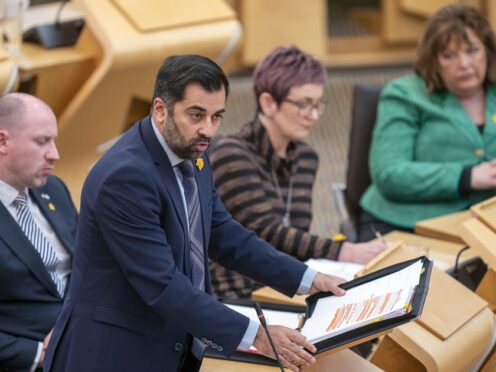Humza Yousaf has pledged to look into the case of a woman denied the preventative surgery for cancer her sister underwent, despite both having a gene making them more likely to develop the disease.
Gill Gooding and her sister, Jo Thompson, both have the CHEK2 cancer gene with a high risk of developing the disease.
The women have already had several family members die from cancer, with Ms Thomson having a double mastectomy to reduce her chances of becoming ill in the future.
However, Liberal Democrat leader Alex Cole-Hamilton said that Ms Gooding had been denied the same procedure – and had had to fight to access testing to see if she had the CHEK2 gene.
An international study has shown that Scotland is amongst the longest waits and poorest access to cancer treatment.
When cancer rips through your family the last thing you need is to fight for care.
We need to ensure that all patients have the highest quality cancer care. pic.twitter.com/niC0vZxujK
— Scottish Lib Dems (@scotlibdems) February 29, 2024
He pressed Mr Yousaf on the difference in treatment the two sisters have received at First Minister’s Questions at Holyrood, saying the women had seen both their parents, a cousin, aunt and two grandparents all die from cancer.
While he recounted how Ms Thomson “was given preventative surgery and reconstruction in Edinburgh” after she had tested positive for the CHEK2 cancer gene, he said Ms Gooding’s treatment had been different.
Mr Cole-Hamilton said: “Gill was repeatedly denied genetic testing by NHS Glasgow, despite her family history. She persevered and discovered that she does have that gene.
“But now she is being told that the surgery her sister received in Edinburgh isn’t available in Glasgow, meaning far longer waits and recovery times.”

The Liberal Democrat leader added: “All Gill wants to do is to see her young children grow up – something her mother never got to do.”
He urged the First Minister to look into the case and to “ensure that all patients, wherever they live, have the highest quality cancer care”.
Mr Yousaf, who was health secretary before becoming First Minister, said he was “more than happy to look into this case”.
He added: “I will wait for Alex Cole-Hamilton to send Gill’s details and we will see what we can do.”
But he also insisted “improvements” were being made in cancer care, despite conditions in the NHS being “extremely challenging” post-pandemic.
He highlighted the “really positive results” achieved by Scotland’s first rapid cancer diagnostic services (RCDS) in reducing the time that patients have to wait to be diagnosed.
An evaluation report published by the University of Strathclyde and the Centre for Sustainable Delivery (CfSD) found patients waited an average of 14 days from being referred to having cancer either confirmed or ruled out.
These services have been put in place in five health board areas to try to speed up cancer diagnoses for patients with non specific symptoms, such as unexplained weight loss, persistent nausea or fatigue, where their GP is concerned cancer could be the cause.
Over the two-year evaluation period, the services saw 2,489 patients, with more than 96% of them giving the care they received a positive satisfaction rating of eight out of 10 or more.
Visiting NHS Lanarkshire’s RCDS at University Hospital Wishaw, Health Secretary Neil Gray said: “Improving cancer services is a priority for the Scottish Government, as set out in our 10-year strategy published last year.
“This positive evaluation of Scotland’s rapid cancer diagnostic service provides valuable insight into their role in achieving vital, earlier, cancer diagnoses and improving patient care.
“RCDSs reflect our commitment to enhancing equitable cancer services across NHS Scotland – this report has shown the pivotal role they can play in early cancer detection while delivering quality patient-centred care.
“As Scotland’s cancer care continues to evolve, RCDSs stand as an essential component in improving outcomes.”
